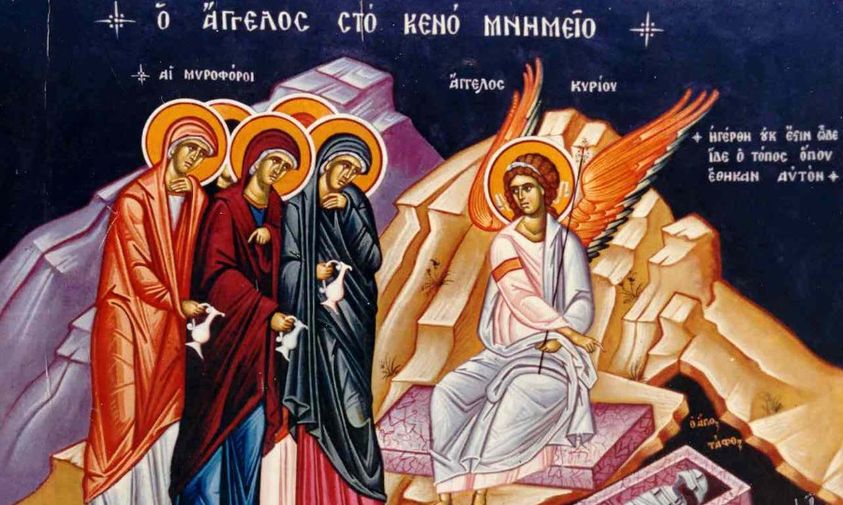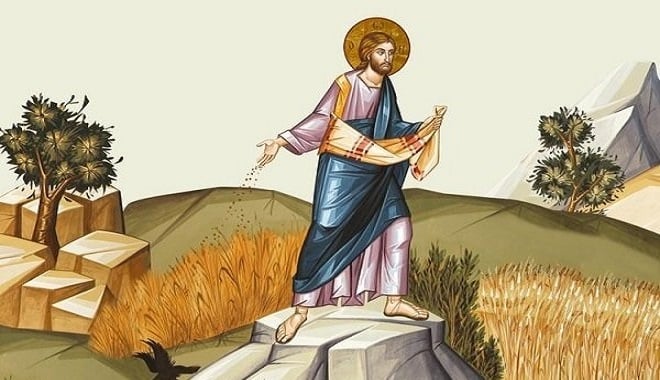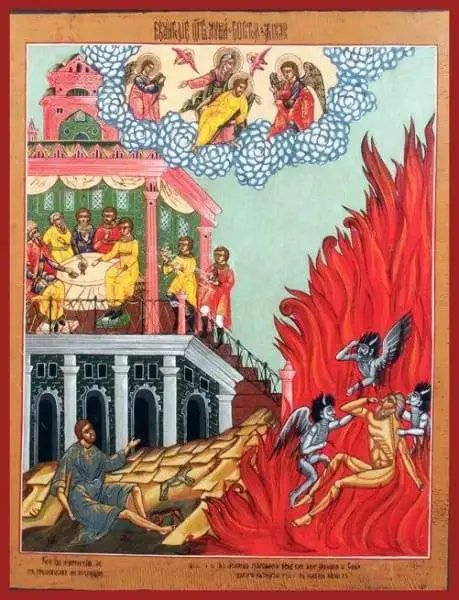
CHRISTOS VOSKRESE, CHRIST IS RISEN, CHRISTOS ANESTI
In the name of the Father, and of the Son, and of the Holy Spirit. Amen.
My beloved brothers and sisters in Christ,
Today, on this third Sunday of Pascha, our Holy Orthodox Church commemorates the Myrrh-Bearing Women, along with the Noble Joseph of Arimathea and Nicodemus. We stand between the joy of the Resurrection and the wonder of Thomas’s confession and now turn our attention to these courageous disciples who ministered to our Lord in His death and were the first to receive the glad tidings of His Resurrection.
The Holy Gospel tells us that early on the first day of the week, while it was still dark, Mary Magdalene, Mary the mother of James, Salome, Joanna, and the other women came to the tomb of our Lord bearing myrrh and spices to anoint His body according to Jewish custom. Their journey to the tomb was an act of profound courage and love. While the male disciples remained hidden behind locked doors for fear of the Jews, these women ventured out in the darkness of early morning, risking their safety to perform this final act of devotion for their crucified Master.
Saint John Chrysostom extols their bravery, saying: “The women proved themselves more manly than the disciples. When they had seen all the disciples fled, they remained, seeking to behold the Christ despite the danger, despite the fear of the Jews.” Indeed, while fear paralysed the apostles, love propelled these women forward. Their example teaches us that love for Christ must transcend our fear of worldly consequences.
As they journeyed to the tomb, the women had one practical concern: “Who will roll away the stone from the door of the tomb for us?” (Mark 16:3). The stone was large, beyond their physical strength to move. Yet remarkably, this did not deter them. They proceeded in faith, not knowing how their mission would be accomplished, but trusting that their act of love would not be in vain.
How often in our own spiritual lives do we hesitate to act because we cannot see how all obstacles will be overcome? The myrrh-bearers teach us that faithful action often precedes the resolution of difficulties. Had they waited until they knew how the stone would be moved, they would never have been the first witnesses to the Resurrection. Their faithfulness in moving forward despite unanswered questions stands as a powerful example for us.
Upon arriving at the tomb, the women discovered that the stone had already been rolled away, and an angel proclaimed the astonishing news: “Do not be alarmed. You seek Jesus of Nazareth, who was crucified. He is risen! He is not here. See the place where they laid Him” (Mark 16:6).
Consider the extraordinary reversal that occurred in that moment. These women had come to minister to a dead body, to perform the ritual anointing that would complete the burial process. Instead, they found themselves recipients of the greatest news in human history. They who came to minister to Christ were instead ministered to by Him through the angelic announcement of His victory over death.
Saint Gregory Palamas beautifully observes: “They came expecting to find a corpse but heard that the Lord was alive. They expected to perform a service of mourning but were commanded to rejoice. Instead of myrrh, they received the fragrance of divine joy.”
The angel then commissioned these women with a sacred task: “Go, tell His disciples and Peter that He is going before you into Galilee; there you will see Him, as He said to you” (Mark 16:7). In that moment, their role transformed from myrrh-bearers to evangelists, from those who would anoint the dead to those who would proclaim new life. This is why our Orthodox tradition honours them with the title “Equal to the Apostles” and “Apostles to the Apostles.”
It is profoundly significant that in a society where women’s testimony was not valued in legal proceedings, God chose women to be the first witnesses and proclaimers of the Resurrection. As Saint Peter Chrysologus writes, “God makes the female the apostle of the apostles, so that she who had been the gateway of death might be the first to announce the entrance to life.”
Alongside the myrrh-bearing women, we also commemorate today the Noble Joseph of Arimathea and Nicodemus. Joseph, described in Scripture as “a good and just man” who was “waiting for the kingdom of God,” courageously went to Pilate to request the body of Jesus. Despite being a member of the Sanhedrin that had condemned Christ, he overcame his fear and publicly associated himself with the crucified Lord now when such association seemed most foolish by worldly standards.
Nicodemus, who had first approached Jesus by night, now came openly, bringing a mixture of myrrh and aloes weighing about a hundred pounds. Together, these two secret disciples took the body of Jesus, bound it in linen cloths with the spices, and laid it in Joseph’s new tomb hewn from the rock.
The actions of Joseph and Nicodemus remind us that sometimes faith must move from the shadows into the light. As Saint John tells us, “For everyone practicing evil hates the light and does not come to the light, lest his deeds should be exposed. But he who does the truth comes to the light, that his deeds may be clearly seen, that they have been done in God” (John 3:20-21). In the crucifixion of Christ, these secret disciples found the courage to step into the light and publicly proclaim their devotion to Him.
How, then, do we apply the example of the myrrh-bearers to our own lives? I suggest three practical responses:
First, let us cultivate courage in our faith. The myrrh-bearers ventured out while it was still dark, not knowing what they would encounter. In a world increasingly hostile to authentic Christianity, we too must find the courage to live and proclaim our faith even when doing so involves risk or discomfort.
Second, let us be persistent in our devotion. The women came to perform an act of love that seemed futile by worldly standards. The one they loved was dead; their anointing could not restore Him to life. Yet they came anyway, driven by love that transcended practical considerations. Similarly, our prayers, liturgical worship, and acts of mercy may sometimes seem to accomplish little in worldly terms. Yet we persist, knowing that love offered to Christ is never wasted.
Third, let us become bearers of good news. The myrrh-bearers departed from the tomb with a mission to proclaim the Resurrection. We who have received the same glad tidings must also become evangelists, sharing the joy of the Risen Christ with a world shrouded in the darkness of materialism, hedonism, and despair.
May we, like Joseph and Nicodemus, have the courage to publicly identify ourselves with Christ, even when doing so seems foolish by worldly standards. May we, like the myrrh-bearing women, persist in our love for Christ even when the path forward seems unclear. And may we, having encountered the Risen Lord, become bearers not of spices for the dead but of the sweet fragrance of the Gospel of life.
Christ is Risen! Indeed, He is Risen!
Amen.
Copyright © 2025 The Rev. Adrian Augustus. The Russian Orthodox Church of the Archangel Michael, Blacktown, NSW


